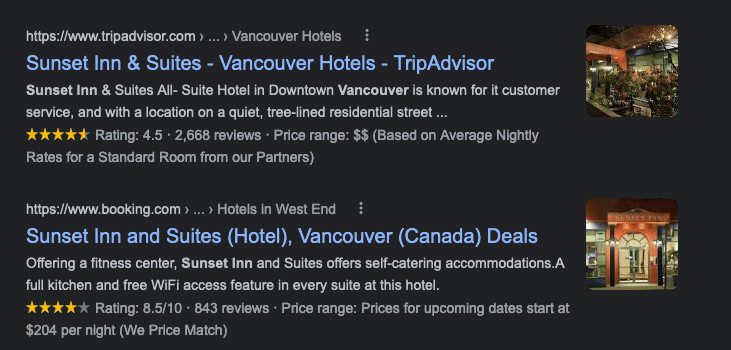If you work in the travel industry, you know how important it is to have as much real estate on the SERPs as possible. It is critical to invest time and effort into your website rather than allowing OTA’s, comparators or review aggregators tell your site’s story. Structured data, also known as Schema mark-up, can help your website speak the language of the search engines and increase your online visibility.
Hotel schema is a code that you can add to your website to help search engines better understand your hotel business and improve your visibility in search results. This code, also known as structured data, allows you to provide detailed information about your hotel, such as its name, address, contact information, room rates, and amenities. Adding structured data to your hotel’s website is crucial in standing out against your competition when being crawled by search engines.
What is Structured Data?
Schema markup, also known as structured data, is code (or language) that allows search engines to better understand certain information on your website. Schema markup can be beneficial to several types of businesses, but for this article, we’re specifically going to focus on hotel Schema. We will show you some best practices for implementing structured data for your website and discuss the potential benefits on the SERPs.
Structured data, of course, is just one aspect of technical SEO, but it’s an important component in your travel marketing toolbox. Semantic HTML, in addition to structured data, is essential for improving the appearance of your website in the SERPs, resulting in increased traffic and (hopefully) more leads. The best way to begin to understand the end goal is to see a few screenshots from Google’s search results for some hotel-related queries.

As you can see from the above example, Schema markup is used to generate a variety of top-level displays (or SCRBs) on the SERPs (search engine results pages), such as star ratings for a product or hotel, or food photos and recipes from a food website.
Special Content Result Blocks (SCRBs)
According to Google, a content results block, similar to a featured snippet will directly answer the search query in Google’s answer box. So, for example, “weather boxes,” “movie carousels,” “food calories,” “sports scores,” YouTube videos, and featured snippets are all technically known as “Special Content Result Blocks.”
Structured data is responsible for a variety of these top-level positions on the SERPs, including star ratings on a product or hotel. For non-branded search queries, special elements in the SERPs might attract a large number of clicks and user attention, as well as raise brand prominence for these types of requests. They’re also worth it to acquire since they increase your company’s visibility, which is particularly important when you’re just getting started.
How Do I Use Schema to Enhance My Hotel’s Website?
Creating a structured data mark-up and/or Schema code for your website is mostly straightforward. The majority of Schema markup should be placed in the head section of your website, but there are exceptions.
Depending on your CMS, you may require developer help to implement Schema, but there may also be some plugins and modules available for your platform, such as:
- uSchema (WordPress)
- Schema Pro
- WP Review Pro
Example of Hotel Schema
Hotel Schema is the most obvious choice to use for your hotel website and then next would be Organization or LocalBusiness. A few other travel related schema implementations are:
- lodgings
- luggage
- group holidays
- airlines
- tour operators
What to keep in mind when deciding which Schema to use:
The three core objects when modeling hotel-related information in Web content with schema.org are:
- A lodging business, examples are a hotel, hostel, resort, or a campsite): The lodging business encompasses multiple buildings but is typically a coherent place, housing the actual units of the establishment (e.g. hotel rooms).
- An accommodation, For example, the actual relevant units of the establishment could be hotel rooms, suites, apartments, meeting rooms, camping pitches, etc. These are the actual objects that are offered for rental.
- A booking for a stated amount of money and for a specific usage (such as occupancy) that may be further restricted by advanced booking requirements and other conditions. Often called an offer to let a hotel room (or other forms of accommodations) for a particular price with certain restrictions.
If the hotel that you’re adding structured data to is a chain, you can also use parentOrganization (useful for chain hotels like Schahet Hotels).
Review Schema Example
Review Schema is beneficial if used correctly; on the other hand, incorrect usage could result in a Structured Data Mark-up Penalty.
Things To Consider
The aggregateReview rating should be used for site-wide and product-wide ratings, while review schema should only be used on individual pages. This will ensure that the reviews are unique to each product.

Structured Data Testing Tool & Validator
If you’re having trouble wrapping your head around schema markup, this feature in Google Search Console will come in handy; the perfectly named Structured Data Markup Helper.
Once you’ve completed your code, you should use Google’s own Structured Data Testing Tool to verify that it is correct and there are no errors. While Google’s structured data testing tool can help verify your code, there is no guarantee that you will get rich snippets or SCRBs.
Hotel competition can be steep and taking advantage of Schema.org and implementing the correct structured data for your hotel website, can give you a leg up on your toughest competition. It is important to note that schema isn’t a direct ranking factor and will not directly (or immediately) improve your rankings but personal experience suggests it can be a huge help to your visibility on the SERPs. Take your time and make sure you’ve done everything correctly before setting everything live. If you’re still having trouble and need a little extra help, we highly recommend reaching out to Hospitality Digital Marketing and getting help from a company that specifically caters to hotels.

